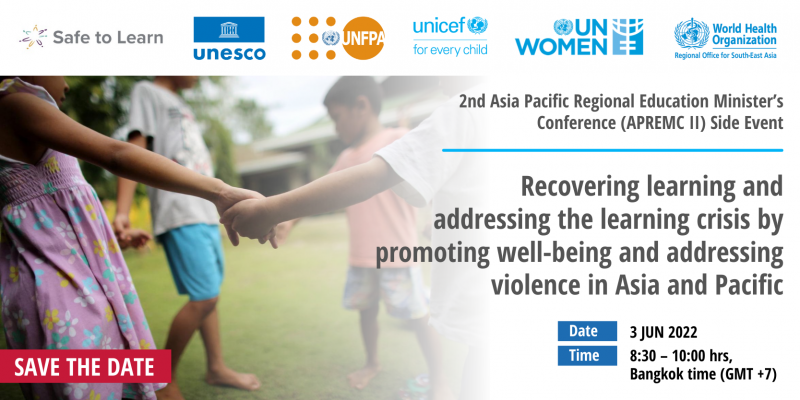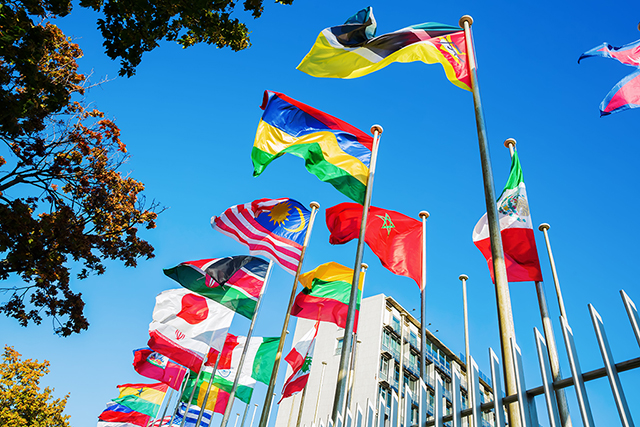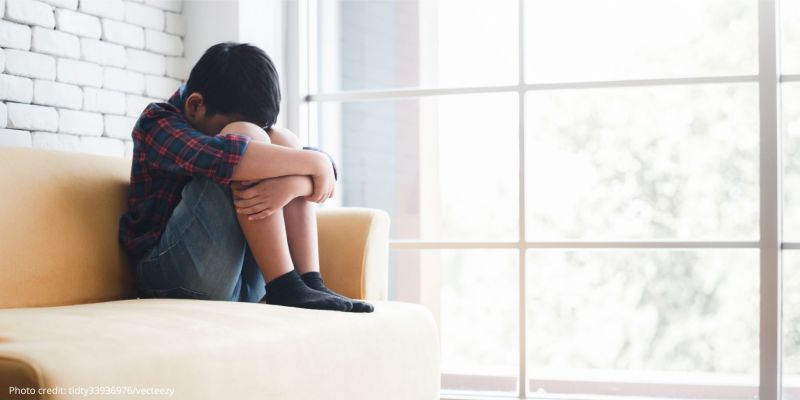UNESCO promotes well-being and prevention of violence to strengthen learning recovery in Asia-Pacific
The importance of student well-being and freedom from violence in the post-pandemic era was highlighted in a side event at the 2nd Asia-Pacific Regional Education Minister’s Conference (APREMC-II), June 2022, in Bangkok
Violence is aggression. Violence can be physical, psychological or sexual, including corporal punishment, verbal abuse and sexual harassment. Growing evidence now attests that all forms of violence, including gender-based violence and related stresses to learners’ emotional and mental well-being, not only negatively impact students' school attendance and completion rates, but also their learning outcomes. Globally, up to 1 billion children experience or witness some form of violence, and in a wide variety of settings, including in, around, and on the way to and from their schools; online platforms and social media; and in their own homes and communities. Analyses from the Southeast Asia Primary Learning Metrics (SEA-PLM) of 2019 confirm that negative learning outcomes are directly associated with exposure to violence at school.
Addressing violence and promoting overall student well-being has become a top priority in Asia and the Pacific during the COVID-19 pandemic. Emergency confinements of students and the widespread periodic or long-term shuttering of schools during the pandemic have disrupted both formal and informal protective measures in existing education systems, thereby putting children at increased risk of violence. For the most vulnerable children in this vast region, closures of schools and resulting confinements can mean greater exposure to violence, exploitation and abuse, neglect, or targeting by cyberbullying, all with potential detrimental or catastrophic effect on children's academic performance. A recent survey from Save the Children found that when schools were closed, the rate of becoming the target of violence doubled in the family household. Without establishing a secure learning environment where students feel safe and know that they are free of experiencing any form of violence, meaningful and sustainable learning recovery cannot be achieved. It is imperative, therefore, that violence and associated mental health risks are tackled as part of, and integrated in, the Asia-Pacific learning recovery agenda, and play a part in any long-term measures to respond to the region’s pre-existing and, more recently, pandemic-induced learning crises.

The importance of preventing violence and fostering learner well-being was spotlighted at the 2nd Asia-Pacific Regional Education Minister’s Conference (APREMC-II), in a webinar side event organized by Safe to Learn, UNESCO, UNICEF, Plan International, UNFPA, UN Women and WHO, ‘Recovering learning and addressing the learning crisis by promoting well-being and addressing violence in Asia and Pacific’ (hereafter ‘Recovering Learning’), held on 3 June 2022. The ‘Recovering Learning’ webinar brought together experts to share guidance and pragmatic recommendations on effective strategies for promoting student mental health and tackling and preventing violence through regional learning recovery efforts, and through the transformation of Asia-Pacific education systems in the post-pandemic period. By the end of the event, it had become clear to all participants that with efficient and effective strategies, it is possible to ensure that every student feels safe and secure in the school environment.
It was noted during the webinar that violence against children can additionally have a far-reaching financial impact on regional and global economies. According to Quentin Wodon, a Lead Economist for Education Global Practice at the World Bank, the cost of violence in and around school in lost future lifetime earnings could be of the order of US$11 trillion. (See the related whole World Bank report here.)
During the event, a ‘whole-education’ approach to ending violence in schools was discussed by Dr Shoko Yoneyama, a senior lecturer at the School of Social Sciences, University of Adelaide, and member of UNESCO’s Scientific Committee on Preventing and Addressing School Bullying and Cyberbullying. This holistic approach to reducing violence and bullying in schools provides a comprehensive and systemic framework toward comprehensively addressing the problem, including legal and policy factors that lie beyond the whole-school setting. Students’ learning and well-being can be greatly enhanced, and the education system can be made more inclusive and sustainable by application of this methodology.

Apart from such research, practices to end violence in schools in the unique contexts presented by different countries were also fruitfully shared in the Recovering Learning webinar. Among all types of violence, SRGBV can affect millions of children and can be perpetuated by gender norms or stereotypes, resulting in learner depression and lower educational outcomes. Dr Ferdousi Begum, Lead of Sexual and Reproductive Health and Rights, Plan International, Bangladesh, presented on Plan’s Gender Equity Movement in Schools (GEMS) programme, a school curriculum aimed expressly at raising youth awareness of gender-based violence. In schools where GEMS was implemented, teachers were responsible for facilitating classroom activities related to gender-based violence. Students were also given an activity book, GEMS Diary, to reinforce messages given in classroom on gender and violence.
School-related violence and students’ mental health issues have rightly captured worldwide attention. Their significance has been acknowledged at length by UNESCO. To further raise public awareness of these issues, the first Thursday of every November has been designated International Day against Violence and Bullying at School Including Cyberbullying by UNESCO Member States. UNESCO along with its partners will continue to address violence and students’ well-being in the interest of creating an inclusive and sustainable environment for all learners.
Reported by Wen Yuxi, Intern, Education for Health and Wellbeing Team, Section of Inclusive Quality Education (IQE), UNESCO Asia and Pacific Regional Bureau for Education (UNESCO Bangkok)
For more information:
1. School-based violence prevention: a practical handbook (World Health Organization, 2019)
2. INSPIRE: Seven strategies for ending violence against children (World Health Organization, 2016)
3. Safe to Learn: a global initiative working to end all forms of violence against children in and through schools (UN and Partners, 2016–present)







